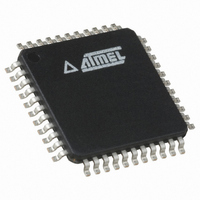ATMEGA164PA-AU Atmel, ATMEGA164PA-AU Datasheet - Page 175

ATMEGA164PA-AU
Manufacturer Part Number
ATMEGA164PA-AU
Description
MCU AVR 16KB FLASH 20MHZ 44TQFP
Manufacturer
Atmel
Series
AVR® ATmegar
Specifications of ATMEGA164PA-AU
Core Processor
AVR
Core Size
8-Bit
Speed
20MHz
Connectivity
I²C, SPI, UART/USART
Peripherals
Brown-out Detect/Reset, POR, PWM, WDT
Number Of I /o
32
Program Memory Size
16KB (8K x 16)
Program Memory Type
FLASH
Eeprom Size
512 x 8
Ram Size
1K x 8
Voltage - Supply (vcc/vdd)
1.8 V ~ 5.5 V
Data Converters
A/D 8x10b
Oscillator Type
Internal
Operating Temperature
-40°C ~ 85°C
Package / Case
44-TQFP, 44-VQFP
Cpu Family
ATmega
Device Core
AVR
Device Core Size
8b
Frequency (max)
20MHz
Interface Type
2-Wire/SPI/USART
Total Internal Ram Size
1KB
# I/os (max)
32
Number Of Timers - General Purpose
3
Operating Supply Voltage (typ)
2.5/3.3/5V
Operating Supply Voltage (max)
5.5V
Operating Supply Voltage (min)
1.8V
On-chip Adc
8-chx10-bit
Instruction Set Architecture
RISC
Operating Temp Range
-40C to 85C
Operating Temperature Classification
Industrial
Mounting
Surface Mount
Pin Count
44
Package Type
TQFP
Package
44TQFP
Family Name
ATmega
Maximum Speed
20 MHz
Operating Supply Voltage
2.5|3.3|5 V
Data Bus Width
8 Bit
Number Of Programmable I/os
32
Number Of Timers
3
Lead Free Status / RoHS Status
Lead free / RoHS Compliant
Available stocks
Company
Part Number
Manufacturer
Quantity
Price
- Current page: 175 of 581
- Download datasheet (27Mb)
18.4.2
18.4.3
8272A–AVR–01/10
Double Speed Operation (U2Xn)
External Clock
Table 18-1.
Some examples of UBRRn values for some system clock frequencies are found in
page
The transfer rate can be doubled by setting the U2Xn bit in UCSRnA. Setting this bit only has
effect for the asynchronous operation. Set this bit to zero when using synchronous operation.
Setting this bit will reduce the divisor of the baud rate divider from 16 to 8, effectively doubling
the transfer rate for asynchronous communication. Note however that the Receiver will in this
case only use half the number of samples (reduced from 16 to 8) for data sampling and clock
recovery, and therefore a more accurate baud rate setting and system clock are required when
this mode is used. For the Transmitter, there are no downsides.
External clocking is used by the synchronous slave modes of operation. The description in this
section refers to
External clock input from the XCKn pin is sampled by a synchronization register to minimize the
chance of meta-stability. The output from the synchronization register must then pass through
an edge detector before it can be used by the Transmitter and Receiver. This process intro-
164A/164PA/324A/324PA/644A/644PA/1284/1284P
Operating Mode
Asynchronous Normal
mode (U2Xn = 0)
Asynchronous Double
Speed mode (U2Xn = 1)
Synchronous Master
mode
195.
f
UBRRn
OSC
Equations for Calculating Baud Rate Register Setting
Figure 18-2 on page 174
System Oscillator clock frequency
Contents of the UBRRHn and UBRRLn Registers, (0-4095)
Equation for Calculating Baud
BAUD
BAUD
BAUD
=
=
=
----------------------------------------- -
16 UBRRn
Rate
-------------------------------------- -
8 UBRRn
-------------------------------------- -
2 UBRRn
for details.
(
(
(
(1)
f
f
f
OSC
OSC
OSC
+
+
+
1
1
1
)
)
)
UBRRn
UBRRn
UBRRn
Equation for Calculating UBRR
=
=
=
----------------------- - 1
16BAUD
------------------- - 1
8BAUD
------------------- - 1
2BAUD
Value
f
f
f
OSC
OSC
OSC
Table 18-9 on
–
–
–
175
Related parts for ATMEGA164PA-AU
Image
Part Number
Description
Manufacturer
Datasheet
Request
R

Part Number:
Description:
8-bit Microcontroller With 16/32/64k Bytes In-system Programmable Flash - Atmel Corporation
Manufacturer:
ATMEL Corporation
Datasheet:

Part Number:
Description:
8-bit Microcontroller with 16/32/64K Bytes In-System Programmable Flash
Manufacturer:
ATMEL [ATMEL Corporation]
Datasheet:

Part Number:
Description:
Manufacturer:
Atmel Corporation
Datasheet:

Part Number:
Description:
IC AVR MCU 16K 16MHZ 5V 44TQFP
Manufacturer:
Atmel
Datasheet:

Part Number:
Description:
IC AVR MCU 16K 16MHZ 5V 44-QFN
Manufacturer:
Atmel
Datasheet:

Part Number:
Description:
IC AVR MCU 16K 16MHZ 5V 40DIP
Manufacturer:
Atmel
Datasheet:

Part Number:
Description:
MCU AVR 16K FLASH 16MHZ 44-QFN
Manufacturer:
Atmel
Datasheet:

Part Number:
Description:
IC AVR MCU 16K 16MHZ COM 40-DIP
Manufacturer:
Atmel
Datasheet:

Part Number:
Description:
IC AVR MCU 16K 16MHZ COM 44-QFN
Manufacturer:
Atmel
Datasheet:

Part Number:
Description:
IC AVR MCU 16K 16MHZ IND 40-DIP
Manufacturer:
Atmel
Datasheet:

Part Number:
Description:
IC AVR MCU 16K 16MHZ IND 44-QFN
Manufacturer:
Atmel
Datasheet:

Part Number:
Description:
IC AVR MCU 16K 16MHZ IND 44-TQFP
Manufacturer:
Atmel
Datasheet:

Part Number:
Description:
IC MCU 8BIT 16KB FLASH 44TQFP
Manufacturer:
Atmel
Datasheet:

Part Number:
Description:
MCU AVR 16K FLASH 16MHZ 44-TQFP
Manufacturer:
Atmel
Datasheet:











